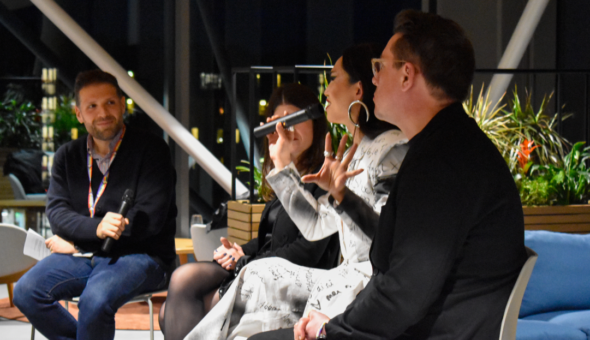This month the blog has focused on women, and particularly how we can #PressforProgress to achieve gender parity. To close our series, Dean of the School of Management Veronica Hope Hailey shares her views with Andrew Crane on women in leadership, and about what role business schools can play in creating truly diverse organisations.
AC: From your research and experience, what do we know about women in leadership?
VHH: The idea that 50% of the world’s population doesn’t get fair representation in leadership in organisations is curious. For some businesses, where huge numbers of their consumers are women, it’s even more curious. The idea that you can run a business in the 21st century without your leadership having a fair representation of the working population, particularly when your products are geared towards women, seems to me a deeply flawed idea.
We know that diverse teams out-perform homogeneous teams. So we need diversity, but it’s not just about gender – we need diversity of thought. The difference between out-performing or underperforming teams is the extent to which diversity is consciously managed at a senior level.
AC: So are there clear ways in which diversity should be managed to enable equality of representation?
VHH: I actively manage diversity of thought. I know that my management and leadership thinking is more robust if I bring people into a team who have very different thinking from myself, and from each other. You need people with different perspectives, and that’s not just to do with gender.
But there’s no point having quotas, or having women represented, if you’re not going to hear their voice. I have been in a meeting where a woman who was deputising for her male boss was told by the male chair that he didn’t think she’d have any contribution to make. It’s not surprising that women find it difficult to make their voices heard.
AC: So in that environment, how do you inspire women to be leaders?
VHH: I think it’s behoven on those of us who are in senior roles to illustrate what fun it can be. There’s a very male model that has dominated in the last 25 years, the “superman” image. I think there should be different narratives as to what leadership is about. It doesn’t have to be superman - some of the most effective leaders I’ve come across are the opposite of that. I think we should encourage different styles of leadership to come forward.
AC: We know there are fewer women than men in the higher ranks of academia. We have just shared some research on the blog showing that women’s work is not as well cited or recognised. What can we do in business schools to promote better parity?
VHH: There was research done a few years ago which showed that in the UK, if we carried on at the current rate of promoting women to full professorships, it won’t be until 2047 that we get equal numbers of male and female professors in business schools. That is absolutely appalling.
During my career, I’ve been incredibly lucky to have a lot of personal development, and this has really helped me to progress. It increased my self-awareness, and helped me understand leadership beyond just theory.
I decided to launch a women in leadership programme here in Bath, open to women across the University. It was entirely taught by external people because I felt it was important to allow women to talk openly and freely about their experiences and their careers.
Organisations have been traditionally made by men for men, and it’s sometimes easier for men to navigate through them. So I think women need more help with professional development, but not because they’re less able. As a woman at a senior level, you will find yourself sitting in meetings that are otherwise entirely male. How you navigate your way through that is something that you need to be able to talk about.
We also need to work with men on raising their level of awareness of what constitutes bias, conscious or unconscious. All the hard work, all the calling out about unacceptable behaviour, the superhuman efforts to fit into a male environment, at the moment that’s all done by women. If we really believe in this, and think that diversity is a good thing, it shouldn’t always be women who call it out. We need men to take part in women in leadership programmes, to listen and hear what women really think.
AC: What would your advice be to early career academics – men and women – in navigating this?
VHH: If you really believe that gender parity is a good thing then take a long hard look at the departments where you seek your first appointment. If you’re serious about it, then you should be seeking out places where you can see that women are actually valued and are getting promotion. Men have to say, I don’t want to join a really male oriented, macho environment. It’s a problem that needs to be owned by everyone.
We need to stop stereotyping what we expect from the other gender. We should be exposing people early on to unconscious bias, to stereotypical expectations – maybe we should cover this in PhD training. And we need to help people to understand that diverse teams are better.
AC: What would your pledge be to #pressforprogress
VHH: I thought that 40 years on we’d be further than this. There’s still such blatant humiliation and ridicule of women. I feel a real responsibility to call out bad behaviour. Not for me, for the younger generation. If I don’t do it, who else is going to? So I pledge that at senior levels, I will not stand by and let negative comments be made to or about women, even to my cost.
Header image by rawpixel
Respond



